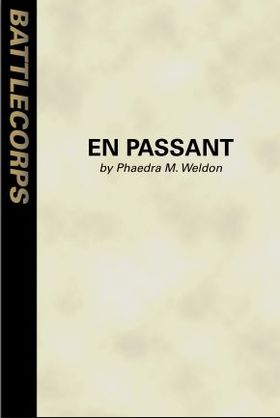En Passant (short story)
Sarna News

- Bad ‘Mechs - Sentinel
- HEXTECH Review - Wave 3 Brings More Urban Options To Your Battlefield
- Your BattleTech News Round-Up For March, 2024
- Crashing 'Mechs With Jennifer Brozek, Author Of The Rogue Academy Trilogy
- Getting The Word Out With Rem Alternis, Catalyst Community & Marketing Director
- Read more →
- This article is about the BattleCorps short story. For the German BattleTech novel by Michael Diel, see En Passant (novel).

| |
| En Passant (short story) | |
|---|---|
| Product information | |
| Type | Short Story |
| Author | Phaedra M. Weldon |
| Pages | 19 |
| Interior Artwork | Matthew Plog |
| Publication information | |
| Publisher | BattleCorps |
| First published | 18 August 2004 |
| Content | |
| Era | Civil War era |
| Timeline | 7 October 3065 |
| Followed by | Epaulet Mate |
First published online on BattleCorps on 18 August 2004, En Passant by Phaedra M. Weldon introduced the character of Päl Wyndham-Sandoval, whose story was continued in Epaulet Mate and Fianchetto.
It was one of the stories that can be downloaded for free from the BattleCorps site for promotional purposes and was also included in the free BattleCorps Fiction Sampler. En Passant was later included in print in the first BattleCorps anthology, The Corps.
Contents
[edit]
| “ | Päl Wyndham-Sandoval has just returned to Robinson after three years away fighting the Combine. But is home really ever a safe harbor? | ” |
Plot summary[edit]
Scion of a noble family, Päl Wyndham-Sandoval has returned from a three-year tour of duty as a MechWarrior with the Robinson Rangers. Reporting on the new Duke Tancred Sandoval's plans about easing relations with Theodore Kurita to his parents, he is embroiled in politics against his wishes. His support of this policy and his loyalty to the Duke cause an argument. Päl's parents regard Victor Steiner-Davion and his allies, including the Duke, as essentially selling out to the Draconis Combine. Subsequently, Päl comes to realize that he is a stranger to his own three-year-old son, who is being raised by his mother in Päl's absence and is becoming another pawn on the political board; his wet-nurse even describes the infant as the Baroness' pet project.
At a reception in honor of his return, Päl notices a black-clad intruder on the estate and happens to eavesdrop on a discussion where his father warns other nobles about how the new Duke's actions will weaken House Davion's defenses against an attack by House Kurita that he claims is likely to occur, in an obvious attempt to sway their already wavering loyalty away from the Duke. Later that night, Päl discovers and brings down an assassin, but both Päl and his wife Khim are wounded in the process. When pressed by Päl, the dying assassin claims that Baroness Wyndham-Sandoval sent him. Small tidbits later reinforce Päl's impression that his own mother set him up to be killed, to blame his death on the Draconis Combine to further his parents' political agenda. Päl comes to regard the political landscape as a chess board, where he is a mere pawn that his mother was going to sacrifice.
Taking up the deadly political game, Päl turns the tables on his mother by claiming in front of the assembled guests at the reception that the assassin had confessed to have been sent by Katherine Steiner-Davion.
Featured characters[edit]
- Chauncy, the nanny
- Khim Wyndham-Sandoval
- Baroness Margarette Wyndham-Sandoval
- Baron Exeter Marquin Wyndham-Sandoval
- Päl Wyndham-Sandoval
Featured places[edit]
- Ashio (mentioned as site of defeat of Robinson's Rangers)
- Exeter (mentioned as family's estates' location)
- Mallory's World (mentioned)
- Robinson
Featured units[edit]
Notes[edit]
- The story is named after a chess move where a Pawn can be taken if it moved out two squares from its starting position instead of only one (a unique move permissible only on a given pawn's first move) to a position adjacent to an opposing pawn; the other pawn may then take it en passant ("in passing") as if it had only moved a single square, as per its normal movement.

